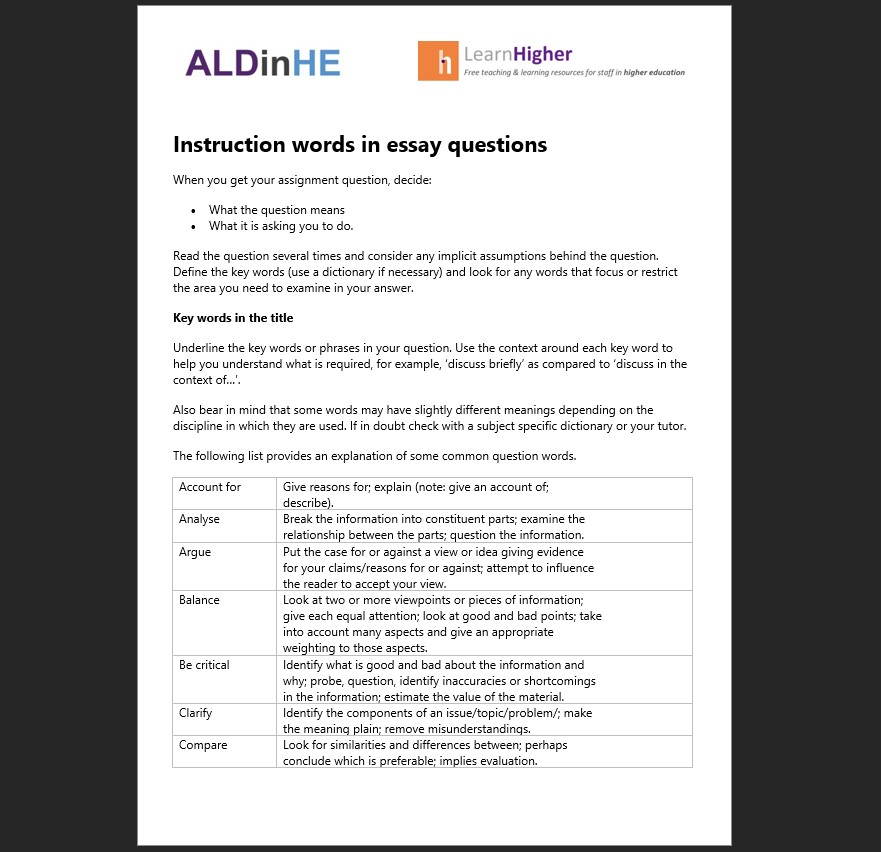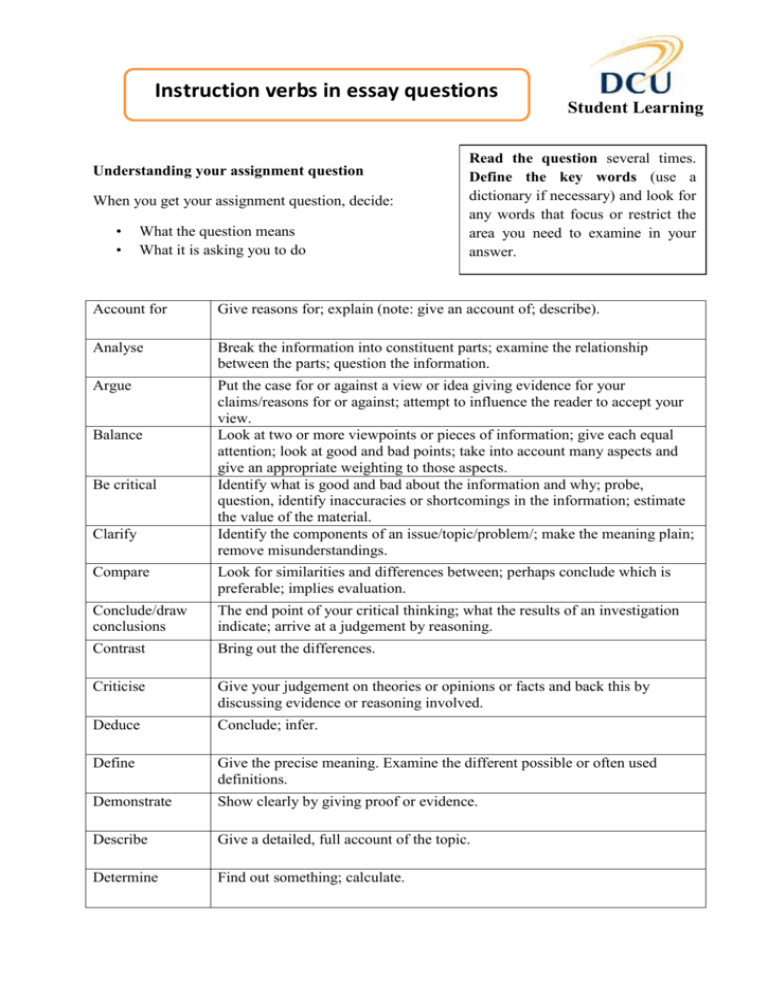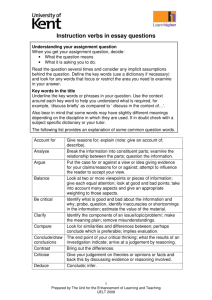
Academic & Employability Skills
Subscribe to academic & employability skills.
Enter your email address to subscribe to this blog and receive notifications of new posts by email.
Join 397 other subscribers.
Email Address
Understanding instruction words in academic essay titles
Posted in: essay-writing

Instruction or command words indicate what your tutor wants you to do in your written assignment. It's vital that you understand exactly what these instruction words mean so you can answer all parts of the essay question and provide a complete response.
Here's a list of some of the most common instruction/command words you'll see in essay questions (and examination questions as well), together with an explanation of what they mean.
Describe: Give a detailed account of…
Outline: Give the main features/general principles; don't include minor details.
Explain, account for, interpret: Describe the facts but also give causes and reasons for them. Depending on the context, these words may also suggest that you need to make the possible implications clear as well. For example: 'Explain X and its importance for Y'.
Comment on, criticise, evaluate, critically evaluate, assess: Judge the value of something. But first, analyse, describe and explain. Then go through the arguments for and against, laying out the arguments neutrally until the section where you make your judgement clear. Judgements should be backed by reasons and evidence.
Discuss, consider: The least specific of the instruction words. Decide, first of all, what the main issues are. Then follow the same procedures for Comment on, Criticise, Evaluate, Critically Evaluate and Assess.
Analyse: Break down into component parts. Examine critically or closely.
How far, how true, to what extent: These suggest there are various views on and various aspects to the subject. Outline some of them, evaluate their strengths and weaknesses, explore alternatives and then give your judgement.
Justify: Explain, with evidence, why something is the case, answering the main objections to your view as you go along.
Refute: Give evidence to prove why something is not the case.
Compare, contrast, distinguish, differentiate, relate: All require that you discuss how things are related to each other. Compare suggests you concentrate on similarities, which may lead to a stated preference, the justification of which should be made clear. These words suggest that two situations or ideas can be compared in a number of different ways, or from a variety of viewpoints. Contrast suggests you concentrate on differences.
Define: Write down the precise meaning of a word or phrase. Sometimes several co-existing definitions may be used and, possibly, evaluated.
Illustrate: Make clear and explicit; usually requires the use of carefully chosen examples.
State: Give a concise, clear explanation or account of…
Summarise: Give a concise, clear explanation or account of… presenting the main factors and excluding minor detail or examples (see also Outline).
Trace: Outline or follow the development of something from its initiation or point of origin.
Devise: Think up, work out a plan, solve a problem etc.
Apply (to): Put something to use, show how something can be used in a particular situation.
Identify: Put a name to, list something.
Indicate: Point out. This does not usually involve giving too much detail.
List: Make a list of a number of things. This usually involves simply remembering or finding out a number of things and putting them down one after the other.
Plan: Think about how something is to be done, made, organised, etc.
Report on: Describe what you have seen or done.
Review: Write a report on something.
Specify: Give the details of something.
Work out: Find a solution to a problem.
Adapted from: Coles, M. (1995), A Student’s Guide to Coursework Writing, University of Stirling, Stirling
Share this:
- Click to print (Opens in new window)
- Click to email a link to a friend (Opens in new window)
- Click to share on WhatsApp (Opens in new window)
- Click to share on LinkedIn (Opens in new window)
- Click to share on Twitter (Opens in new window)
- Click to share on Facebook (Opens in new window)
Click here to cancel reply.
- Email * (we won't publish this)
Write a response
So wonderful can anyone get the information
Thanks Josphat!
This is a life saver, do you have a youtube channel where you talk about all this stuff? If so I would love to know about it 🙂 Rachelle
Hi Rachelle, Thanks for your comment. We don't have a youtube channel but stay tuned for more posts and also check out the new My-skills portal (go.bath.ac.uk/My-skills) for lots more skills support. Tom
Quite helpful. I would definitely check this before my next essay.
Thank you, Dan.
Very helpful now I understand how construct my assignments and how to answer exam questions
I have understood it clearly;)
it is very useful for us to understand many instruction word and what we need to write down
There are some define of some words,and I find that there do have many common things for some words,but not all the same.Such as compare, contrast, distinguish, differentiate, relate,they all need people to compare but foucs on different ways.
Very helpful. Listed most of the words that might be misunderstood by foreign students. Now I know why my score of writing IELTS test is always 6, I even didn't get the point of what I was supposed to write!
I have already read all of this. And it gave me a brief instruction.
There are varied instruction words in essay questions. It's a good chance for me to have a overview of these main command words because I could response to requirements of questions precisely and without the risk of wandering off the topic.
When i encounter with an essay title with these instruction words above,I should understand exactly what these words mean so that i could know what my tutor would like me to do in the assignments.Also,these words may help me make an outline and read academic articles with percific purposes.
These words are accurate and appropriate. It is really helpful for me to response some assignment questions and I can know the orientation of my answers . I can also use these words to make an outline of my essay. However, in my view, for some instruction words which are confusing and hard to understand, it is better to give an example to help us understand.
It's the first time for me to recognise these instruction words , some of them are really similar with each other.
it is very helpful to my future study. it will be better to have some examples with it.
How to navigate Generative Artificial Intelligence (GenAI) tools with confidence and integrity
Artificial intelligence (AI) is advancing rapidly, and new Generative Artificial Intelligence (GenAI) tools like ChatGPT, Claude, Elicit, Perplexity, Bard and Bing are now easily accessible online. As university students, how can you incorporate these emerging technologies into your studies and campus...

8 ways to beat procrastination
Whether you’re writing an assignment or revising for exams, getting started can be hard. Fortunately, there’s lots you can do to turn procrastination into action.

What I learnt from a skills enrichment workshop on feedback
If your course is largely essay-based (like mine is with Politics and International Relations) you’ll understand the frustration of receiving the same feedback on your assignments – over and over and over again.

Use of cookies
Lund University uses cookies to ensure that the website functions properly and to improve your experience.
Read more in our cookie policy
- AWELU contents
- Writing at university
- Different kinds of student texts
- Understanding instructions and stylesheets
Understanding essay/exam questions
- Peer review instructions
- Dealing with feedback
- Checklist for writers
- Research writing resources
- Administrative writing resources
- LU language policy
- Introduction
- What characterises academic writing?
- The heterogeneity of academic writing
- Three-part essays
- IMRaD essays
- How to get started on your response paper
- Student literature review
- Annotated bibliography
- Three versions of the RA
- Examples of specificity within disciplines
- Reviews (review articles and book reviews)
- Popular science writing
- Research posters
- Grant proposals
- Writing for Publication
- Salutations
- Structuring your email
- Direct and indirect approaches
- Useful email phrases
- Language tips for email writers
- Writing memos
- Meeting terminology
- The writing process
- Identifying your audience
- Using invention techniques
- Developing reading strategies
- Taking notes
- Identifying language resources
- Choosing a writing tool
- Framing the text: Title and reference list
- Structure of the whole text
- Structuring the argument
- Structure of introductions
- Structure within sections of the text
- Structure within paragraphs
- Signposting the structure
- Using sources
- What needs to be revised?
- How to revise
- Many vs. much
- Other quantifiers
- Quantifiers in a table
- Miscellaneous quantifiers
- Adjectives and adverbs
- Capitalisation
- Sentence fragment
- Run-on sentences
- What or which?
- Singular noun phrases connected by "or"
- Singular noun phrases connected by "either/or"
- Connected singular and plural noun phrases
- Noun phrases conjoined by "and"
- Subjects containing "along with", "as well as", and "besides"
- Indefinite pronouns and agreement
- Sums of money and periods of time
- Words that indicate portions
- Uncountable nouns
- Dependent clauses and agreement
- Agreement with the right noun phrase
- Some important exceptions and words of advice
- Atypical nouns
- The major word classes
- The morphology of the major word classes
- Words and phrases
- Elements in the noun phrase
- Classes of nouns
- Determiners
- Elements in the verb phrase
- Classes of main verbs
- Auxiliary verbs
- Primary auxiliary verbs
- Modal auxiliary verbs
- Meanings of modal auxiliaries
- Marginal auxiliary verbs
- Time and tense
- Simple and progressive forms
- The perfect
- Active and passive voice
- Adjective phrases
- Adverb phrases
- Personal pronouns
- Dummy pronouns
- Possessive pronouns
- Interrogative pronouns
- Indefinite pronouns
- Quantifiers
- Prepositions and prepositional phrases
- More on adverbials
- The order of subjects and verbs
- Subject-Verb agreement
- Hyphen and dash
- English spelling rules
- Commonly confused words
- Differences between British and American spelling
- Vocabulary awareness
- Useful words and phrases
- Using abbreviations
- Register types
- Formal vs. informal
- DOs & DON'Ts
- General information on dictionary use
- Online dictionary resources
- What is a corpus?
- Examples of the usefulness of a corpus
- Using the World Wide Web as a corpus
- Online corpus resources
- Different kinds of sources
- The functions of references
- Paraphrasing
- Summarising
- Reference accuracy
- Reference management tools
- Different kinds of reference styles
- Style format
- Elements of the reference list
- Documentary note style
- Writing acknowledgements
- What is academic integrity?
- Academic integrity and writing
- Academic integrity at LU
- Different kinds of plagiarism
- Avoiding plagiarism
- About Awelu

- Start here AWELU contents Student writing resources Research writing resources Administrative writing resources LU language policy
- Genres Introduction The Nature of Academic Writing Student writing genres Writing in Academic Genres Writing for Publication Writing for Administrative Purposes
- Writing The writing process Pre-writing stage Writing stage Rewriting stage
- Language Introduction Common problems and how to avoid them Selective mini grammar Coherence Punctuation Spelling Focus on vocabulary Register and style Dictionaries Corpora - resources for writer autonomy References
- Referencing Introduction Different kinds of sources The functions of references How to give references Reference accuracy Reference management tools Using a reference style Quick guides to reference styles Writing acknowledgements
- Academic integrity What is academic integrity? Academic integrity and writing Academic integrity at LU Plagiarism
In some disciplines, take-home exams and open-book exams consist of so-called essay questions. In order to succeed with such assignments, it is vital that you understand what you are expected to do.
Essay questions demand answers with an element of reasoning. This means you are not only expected to present facts but also to provide an interpretation, argument, or reflection which shows that you have understood the course content. The information below is of a general nature; as a student, you must make sure that you understand what the requirements are in your course and in your field.
Understanding the exam/essay question
Read instructions carefully: they are intended to help you complete the assignment, and how well you adhere to instructions will affect your grade. Essay questions often consist of three elements:
1. an informative part that provides some background and context 2. a directive part that tells you how to approach the task 3. an instructional part with instructions on how the text is to be written
You may find that not all elements are provided in each exam question. For instance, some information may be given in an introductory passage that applies to all questions. Such general instructions often stipulate the required format of the answers as well as what resources (if any) may be used.
Instructional verbs
Even though you may very well know what the instructional verbs that you come across in exams mean in general language use, they sometimes have a more specific meaning in exam questions.
Some instructional verbs in exams ask you to demonstrate your knowledge of something (e.g. list , give examples of ) or to show that you have understood something (e.g. explain , compare ). Still other verbs indicate that you need to show that you can use your knowledge (e.g. apply , demonstrate , illustrate ) or that you are able to show your skills in critical thinking (e.g. examine, create, design, justify ).
Although verbs like the ones listed above may be almost synonymous in everyday speech, as instructional verbs in written assignments they require different actions. In the list below, you will find some common instructional verbs and their definitions. Note that some verbs may have a more specific meaning in your field.
To pick up on what instructional verbs may mean in your specific field, read textbooks and scholarly articles carefully, paying attention to how instruction verbs are used.
Composing your answer
In addition to what is said above, the following advice might be useful when you write your answers to exam and essay questions:
Show that you understand the question
If you are asked to apply a theoretical concept or to discuss something from a particular perspective, make sure your answer shows that you understand the issue at hand and that you know how to use the concept. How to do this will depend on your discipline: In some areas, it might be relevant to define terms as you use them in an argument, and in other areas it may be essential that you demonstrate your ability to carry out some kind of calculation.
Stay on track
Students are examined based on how well their answers respond to the stated question. This means you need to provide relevant information and present an on-topic discussion; it also means that information that is not relevant will usually not be assessed.
Check that you have answered the question
Before submitting the exam, go through your answers. Double-check that you have understood the question and the instruction verbs.
- Join ALDinHE

Association for Learning Development in Higher Education


Instruction words in essay questions
- Description
- Reviews (0)
This resource prompts students to initially consider what the assignment question is asking directly, by identifying key phrases. Although variant upon subject, the resource identifies general definitions for key words commonly utilised within essay questions.
There are no reviews yet.
Only logged in customers who have purchased this product may leave a review.
Additional Resource Information
View resources by author(s): LearnHigher
Institution(s): LearnHigher
License: Creative Commons licence (4.0)
Categories: LearnHigher Resources | Assessment
Published: 09/01/2012

Resource Categories
Ohio State nav bar
The Ohio State University
- BuckeyeLink
- Find People
- Search Ohio State
Interpreting a Research or Inquiry-Based Activity
This is intended to be a quick activity to help ensure that students have a clear understanding of the expectations for a research assignment, and to provide the instructor with an opportunity to address any misunderstandings that students might have about the purpose or requirements for the assignment. This is recommended as a low-stakes activity to be used in the early stages of a research or inquiry-based project.
Learning Outcomes
Identify expectations for a research or inquiry-based assignment
Related Resources
- Active Verbs for Writing Assignments (from Colby College)
- Understanding Assignments (from the University of North Carolina Writing Center)
- Instruction Verbs in Essay Questions (from the University of Kent)
Instructions
- Provide students with a written description of an upcoming research or inquiry-based assignment in a handout, in the syllabus, or in Carmen
- Have students complete an activity in which they review and interpret the assignment instructions. This could be an individual, pair, or group activity.
- Write an initial, brief description of what they are expected to do
- Highlight any academic jargon or discipline-specific terminology that may need clarification (e.g. scholarly journal, peer-reviewed article, empirical article, thesis statement, evidence-based practice)
- Identify the key active verbs in the assignment (e.g. define, summarize, synthesize, analyze, compare
- Identify the technical requirements, such as length, writing style, citation style and due date
- What do you consider to be the purpose of this assignment? Why do you think you are being asked to complete this assignment?
- What types of sources are you expected to use? Why do you think you are required to use these sources?
- What steps will you need to take to complete this assignment? What tasks will you need to complete?
- What are the “active” words you highlighted actually asking you to do?
- What do you have to do?
- What should you not do?
- Students should share their responses either with a partner or a small group and identify any potential questions or concerns
- Review and discuss as a class, addressing any misconceptions students might have about the purpose or process of the assignment, and providing additional information as needed
If you have scaffolded the research paper or project, it may be helpful to repeat a version of this activity again closer to the due date, so students can evaluate whether they are on the right track to meeting the expectations for the assignment.
Search for Resources
- Arts & Humanities
- Communications
Instruction verbs in essay questions Student Learning

Related documents

Add this document to collection(s)
You can add this document to your study collection(s)
Add this document to saved
You can add this document to your saved list
Suggest us how to improve StudyLib
(For complaints, use another form )
Input it if you want to receive answer

Some attractive features that you will get with our write essay service
Grab these brilliant features with the best essay writing service of PenMyPaper. With our service, not the quality but the quantity of the draft will be thoroughly under check, and you will be able to get hold of good grades effortlessly. So, hurry up and connect with the essay writer for me now to write.
Finished Papers


IMAGES
VIDEO
COMMENTS
Instruction verbs in essay questions Account for Give reasons for; explain (note: give an account of; describe). Analyse Break the information into constituent parts; examine the relationship between the parts; question the information. Argue Put the case for or against a view or idea giving evidence
Here's a list of some of the most common instruction/command words you'll see in essay questions (and examination questions as well), together with an explanation of what they mean. Describe: Give a detailed account of…. Outline: Give the main features/general principles; don't include minor details. Explain, account for, interpret: Describe ...
List of outline your reply. "Enumerate upon the reasons for the downfall of the Roman Empire.". Show recognition. "Identify each picture by its title and name of the artist.". Provide an itemized list. Present a group of names or items in a category in concise form. "List the musical instruments used in a symphony.".
Direction Words Used in Essay Questions . Compare . Explain similarities and differences. Contrast Explain differences only. Criticize or evaluate . Make a judgment about strengths and weaknesses, positive or negative aspects. Define Give a precise and accurate meaning. Describe . Provide a detailed account. Discuss or explain
Essay question instruction words We can help you to succeed in your studies on or off campus. Just contact us. Learning Support @ Student Success [email protected] 0800 762 786 Analyse: break down the topic into smaller pieces and discuss these in detail. Argue: develop a case or argument to support a particular position or viewpoint.
This workbook is the first in a series of three workbooks designed to improve the. development and use of effective essay questions. It focuses on the writing and use of. essay questions. The second booklet in the series focuses on scoring student responses to. essay questions.
This usually means two things. In some questions it means narrate a sequence of events - outline the story of a particular incident. Alternatively, it can mean show how certain things are connected or affect each other, or show to what extent they are alike. State Outline briefly and clearly the facts of the situation or a side of an argument.
Understanding the essay question is the first and most important step you will undertake with any assignment, as without fully understanding the task you cannot respond to it. Consider the key elements in the question e.g. Examine the role of women in Parliament since 1918, with reference to key Equality legislation and ask yourself:
Verbs Used in Essay Questions. You will be more effective as a student if you know what kind of response is required by different types of questions. In fact, professors construct tests and exams in order to evaluate their students' depth of thought on a given subject. In the process of researching how we think, psychologist Benjamin Bloom ...
Instruction words in Essay Questions Licence: Creative Commons BY-NC-SA 3.0 (and examples) for. Review Make a survey examining the subject carefully; similar to summarise and evaluate. State Present in a brief, clear form. Summarise Give a concise account of the chief points of a matter, removing unnecessary detail. Synthesise
Essay questions often consist of three elements: 1. an informative part that provides some background and context. 2. a directive part that tells you how to approach the task. 3. an instructional part with instructions on how the text is to be written. You may find that not all elements are provided in each exam question.
Give reasons for; explain (note: give an account of; describe) Click the card to flip 👆. 1 / 22
Instruction words in essay questions. Add to basket. Media Type: Document, Handout (s) Resource Duration: 20 minutes. Number of downloads: 1505. Description. Reviews (0) This resource prompts students to initially consider what the assignment question is asking directly, by identifying key phrases. Although variant upon subject, the resource ...
Understanding the instructions: Maths assessment questions usually include particular instructional words that can help you decide how to tackle the problem and how much working needs to be included. ... Instruction verbs in essay questions Author: theobald Last modified by: jc287 Created Date: 12/9/2009 2:00:00 PM
step_1_Instruction_verbs - Read online for free.
"Written tests" with open questions require the candidate to read the question and construct a response (answer). An example is a question requiring an essay as an answer. However, constructed responses can also be much shorter than essays. Each mode of assessment can be designed to be used as an external or internal assessment.
Instruction Verbs in Essay Questions (from the University of Kent) Instructions. Provide students with a written description of an upcoming research or inquiry-based assignment in a handout, in the syllabus, or in Carmen; Have students complete an activity in which they review and interpret the assignment instructions. This could be an ...
Instruction verbs in essay questions Understanding your assignment question When you get your assignment question, decide: • What the question means • What it is asking you to do. Read the question several times and consider any implicit assumptions behind the question. Define the key words (use a dictionary if necessary) and look for any ...
Instruction verbs in essay questions Understanding your assignment question When you get your assignment question, decide: • • What the question means What it is asking you to do Student Learning Read the question several times. Define the key words (use a dictionary if necessary) and look for any words that focus or restrict the area you ...
Mathtutor aims to support students new to university level maths in the following topics: Arithmetic, Trigonometry, Algebra, Differentiation, Functions, Graphs & Sequences, Integration, Geometry and Vectors. ... Instruction verbs in essay questions Author: theobald Last modified by: Si Created Date: 12/17/2010 12:54:00 PM
Instruction Verbs In Essay Questions - 2191 Orders prepared. In the order page to write an essay for me, once you have filled up the form and submitted it, you will be automatically redirected to the payment gateway page. There you will be required to pay the entire amount for taking up the service and writing from my experts.